The Science Fiction of Reality
![[JPG image]](frame1.jpg)
Some 20 to 30 miles upward the world ends and the beginning of nothingness begins. The world is a sphere that hangs in infinite emptiness, blackness and silence in all directions. The stars in the sky are rare exceptions to the aweful emptiness of existence, and their presence is swallowed up in incomprehensible nothingness. The laws of physics exist without our permission or obvious explanation. The wrongness of existence defies reason, emotion and consciousness.
![[JPG image]](frame2.jpg)
What is it that covers the eyes of the human mind? Each day a blazing ball of blinding light and withering heat appears in the sky. Each night the sky opens into a window of darkness revealing that the universe has no bottom. Why does a human being not stare, frozen in stupified awe, or run away and hide in aghast terror, of these sights? The brain notices only differences in the environment. Repetition and constancy must be suppressed for survival. Something new can only remain new for a short time before it must be assimilated into pallid recognition or invisibility. A driver begins by habit to follow the same road home. An animal in the wild looses its ability to see an object that remains stationary. What is not a danger or an object of need cannot be allowed to distract the attention. Sometimes called habituation, this phenomenon, a kind of data compression in the brain's neural network, is fundamental in human consciousness. Our limited focus of attention, the shrinking of our radius of awareness, is a survival trait but is the exact opposite of curiousity. It makes us like witless bugs unaware of a descending heel or the abyss beneath the twig on which we crawl. But some individuals have this faculty taken from them, either by a head injury or a birth defect, and are consigned to never stop asking questions. The world appears to them as a parade of unconnected events, a ledge without foothold, a sea without anchor. They conceal themselves in the human population like agents, like silent observers of the wrongness of existence.
Space travel is a meaningless idea, because there is nowhere to go in space. That is, there is no where to go. Every where is space looks like every other where in space: there is infinite emptiness, darkness with tiny points of light in the background. Location becomes a meaningless concept in space. Put another way, we are in outer space already. The earth is floating in outer space. You can see outer space at night in the sky. But you cannot visit outer space, because outer space is not a location--it is eveywhere and nowhere.
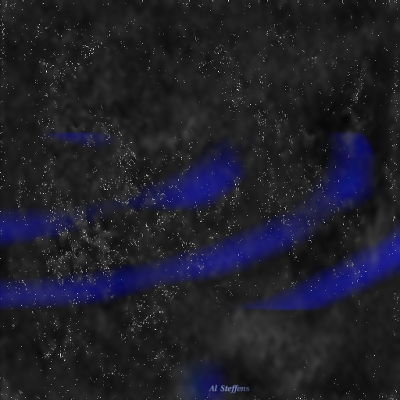
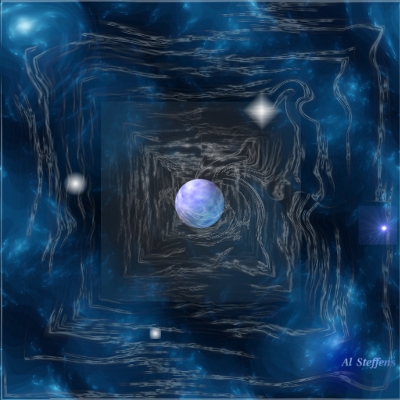
Most physics in science fiction is fiction. The laws of physics enter science fiction according to how well they make human drama possible. Black holes lead to wormholes that allow the vast distances of space to be crossable in the context of human activity. Never mind that there is no such thing as wormholes, and that even black holes are merely theoretical contrivances. Putting real physics into science fiction would reduce the role of human beings in the universe to nothing. Human existence is a flash in the period in which the mountains were made. Civilizations will rise and fade away in the time it would take a space ship to cross between the stars. Real science takes away, rather than gives, the glamor in science fiction.
The law of physics that is never popularized, that even working scientists refuse to confront, is the Arrow of Time. This is the reality, more than any other, that deflates the importance of humanity in the universe. Thermodynamics reveals that the total entropy in the universe is increasing, irreversibly, with time. All events in the universe result from the consumption of free energy and the production of entropy. It is the law of nature that frustrates our attempts to invent a prepetual motion engine. The universe is like a balloon with a very slow leak--leaking free energy irreversibly into entropy, into waste. Eventually, in the far distant future, all free energy will be consumed and no events will be possible. This fate has been called the "heat death" of the universe.
![[JPG image]](frame4.jpg)
Professionals in the sciences rarely consider the overall context of space exporation in the scheme of life, evolution and the arrow of time. The energetics is not there to drive the process. Space exploration is not an activity that individuals can achieve but that whole populations dedicate themselves. The late Isaac Azimov might have incorporated this scenario into his fictional scientific study called psychohistory, had he lived long enough. Whereas individuals are driven by free will, populations behave with properties that appear only as a result of their large numbers. The population, taken as an entity of itself like a gas or a liquid, must obey laws of averages, not the free wills of individuals. If the human population were viewed the same way that a physical chemist views a solution of molecules, then only events that consume energy will occur--actions that transform energy into heat. The chemical name for this is an exothermic reaction. But a space program is an activity that is more like an endothermic reaction, not an exothermic reaction. Building rockets and biospheres, overcoming zero-gravity physiology and finding energy sources are all activities in which the population must give up, not consume, energy. Individuals can do this but populations cannot. An individual might decide to walk into a desert, but populations only migrate to places where the fruit hangs low. The human race cannot expand outward into space any more than the pieces of a broken tea cup can spontaneously put themselves back together.
A standard science fiction theme is to bring a prehistoric man, by time travel, to our era. The point is that our modern technology--radios, air travel, computers-- would seem like magic to someone whose highest technology is a spear. We owe this conception to science fiction writer Auther C. Clarke's law that "any sufficiently advanced technology is indistinguishable from magic." The evidence for this comes from european explorers landing on pacific islands with airplanes, then years later finding a community of aboribinal people worshipping airplane mock-ups. It is doubtful that such an mistake would have occurred had one of those aboriginals been transplanted to a european city. A visitor from the prehistoric past would be briefly awed by televisions, but then he would adjust quite well to our technology. After all, the typical person today has no better understanding of his own technology than would a caveman. In a short time, the prehistoric visitor would be debating sportscars with friends and complaining about reruns on 600 cable channels. The magic of advanced technology is probably just a twentieth century viewpoint.
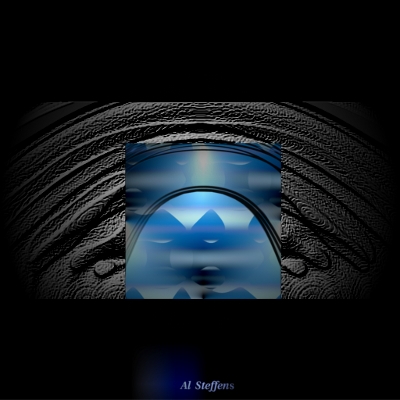
But a visitor from the prehistoric past would find our civilization very uncomfortable. We would seem, to him, to live in a bee hive-like existence: our days enslaved to the clock, our nights imprisioned in small compartments, our "freedom" an illusion that we are not dependent on the vast society in which we live for survival. He would not be able to escape from this beehive. Fleeing the city, everywhere the open country would be guarded by private property signs--those places that are not utterly barren. There would be no animals to hunt and no fruit to gather. The richness of nature that he knew would be entirely exhausted from the earth. He would be forced to return to the bee hive, as we all are, and take his place, take his turn and take his pill of choice. Many of us live under the conception that we live in cities and have high technology because it is better, safer, and obviously more comfortable than the hunter-gatherer existence. But it would be impossible for today's human population to return to hunting and gathering, because the earth will not now yield that kind of energy consumption. Our way of life and technology are necessities not luxuries.
And this is what we should expect for the future of humanity. Technology will advance but human interdependence will increase. Civilization evolves in lock step with the laws of thermodynamics. Humanity as a whole is like the solution in the chemist's beaker that trends toward exothermic reactions. As energy is consumed and becomes harder and harder to obtain the complications of existence will increase. The whole body of society will require a more specialized, synchronized implimentation of its parts. As our interdependence is increased our significance as individuals will diminish. Free space and open range will be barren, exhausted of its energies. There will be no life on the earth save for humans and the food stock. Contrary to some passionate voices in our time, this eventuality will probably not be averted by recycling and environmental awareness. We are hostages to the Arrow of Time and the laws of thermodynamics. We will not master the Arrow of Time because we are a part of it. The Arrow of Time is Existence itself, and we are merely a small, short-lived manifestation of it.
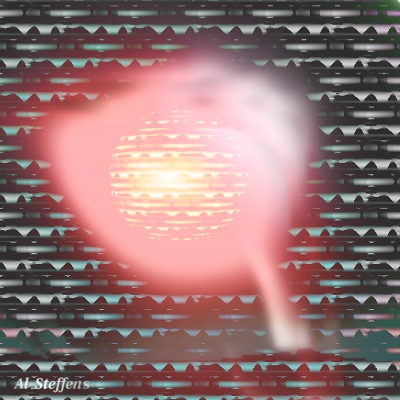
We instinctively perceive an uncrossable boundary between a computer and intelligence, between a robot and a living thing. But scientific thinkers like to be iconoclasts, and predictions that computer algorithms will one day become self-conscious agrees with urban academic imagination and religious contumely. Science fiction writers turn this into a scenario of robots that take over the world. A casual association between information and intelligence leads to the misconception that the human mind is like a computer. Current knowledge in both brain operation and in computer science shows that digital computers are bad analogies to the brain. The brain is better compared to a control system circuit.
The uncrossable abyss between robots and people is equivalent to the difference between a constructed object and a product of evolution. Richard Dawkins has illuminated for us the role of information processing in the evolution of life--DNA and "the selfish gene." But information processing does not illuminate the vast, uncrossable abyss between inert matter and life. It is the energy that sparks life, and information processing is one of the building blocks that enable high energy consumption. Life is built upon matter which is in a state that consumes free energy. Matter having cell walls and DNA consumes free energy more efficiently than a simple acid solution. Living things are embedded in the Arrow of Time, in the increase of the entropy of the universe. Life is endowed with the predatory hunger to consume free energy, and this forms the basis, the prime mobium, for all human activity. The robot can be given an algorithm that resembles thinking, the robot can even be made to consume energy, but the robot cannot be constructed of matter in a state that consumes free energy.
![[JPG image]](frame8.jpg)
Energy is the most important concept in science. If a story discards the law of conservation of energy then it has no science at all. Conservation of energy is one of the few things in science that is inherently understandable as common sense. While most of the mysteries of science are about things you can't see, like atoms or DNA or electricity or planets in space, conservation of energy is a commonplace of life. Energy gives us power--it makes things go, it enables communication, the ability to make things, and to live. Energy gets used up, and then we need to get some more. We wish we could get energy for free, but we can't. We have to work to get more energy, and that is the tragedy of existence itself. We are all slaves to the necessity of renewing our energy. And why should we get more energy? Obviously, so that we can work to get more energy. And then we die. In the bigger picture, our civilization will use up all the energy within its reach and leave behind waste, that is, entropy, and finally darkness. This fate will not be avoided with green technologies: it is the Arrow of Time. The escape from reality afforded to the science fiction reader is only possible by throwing out the Law of Conservation of Energy--that is, science itself. We can live vicariously in a paradise where energy comes from nothing, i.e., where we don't have to work for a living. But in momentary glimses of the horror of reality we see ourselves, chained to the oars of the slave ship Existence, being dragged inexorably forward on the currents of the Arrow of Time, into the hungry jaws of the monster waiting in the pit of Nowhere.
If science fiction does not bring us to the boundaries of knowledge then it must be less than science fiction. It must reduce itself into mere human interest stories. Science fiction in its pure form contains people and human drama only for the perspective it shows on how irrelevant is humanity in the universe. Mixing people with science is like illustrating some unknown object in a photograph side by side with a coin or a ruler. True science fiction is horror transformed from aboriginal superstition to the educated mind. Discoveries in science in the 1800's and 1900's perturbed the popular imagination and rocked the foundations of common sense. This time saw revealed the age of the earth, the vastness of the universe, the uncertainty principle, discoveries of ancient civilizations, and the origins of man. Science was a respected profession, and the discoveries of scientists were as amazing to contemplate as a carnaval ride could shock the senses. And science engendered fear. People, those people who stopped to think about it, saw their lives belittled by the perspective of an immense universe in which Man was not its center. Wierd fiction writer H. P. Lovecraft invented the horror of the unknown, this time impregnated with the poison of scientific realism. Science fiction rose to its greatest, culminating in movies like The Forbidden Planet, and 2001: A Space Odyssy and The Fantastic Voyage. Then in the late twentieth century scientific discovery exhausted itself: the moon landings were achieved, the atomic colliders in physics laboratories reached the limits of human capability, astronomical telescopes reached the farthest distances of the universe, finding more of the same stars and galaxies, and DNA was now revealed as the final constituent of life. Like science itself, science fiction lost the popular imagination and was replaced with people stories embedded in techno scenery and filled with mumbo jumbo talk masquarading as science.
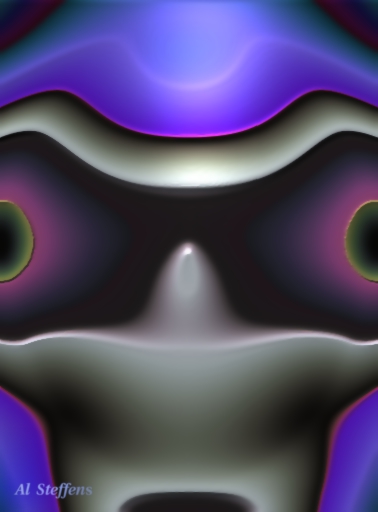
| Writing |
![[JPG image]](../../images/luman_link.jpg)
|
© Alfred Steffens Jr., 2010, Luman Magnum (tm) |